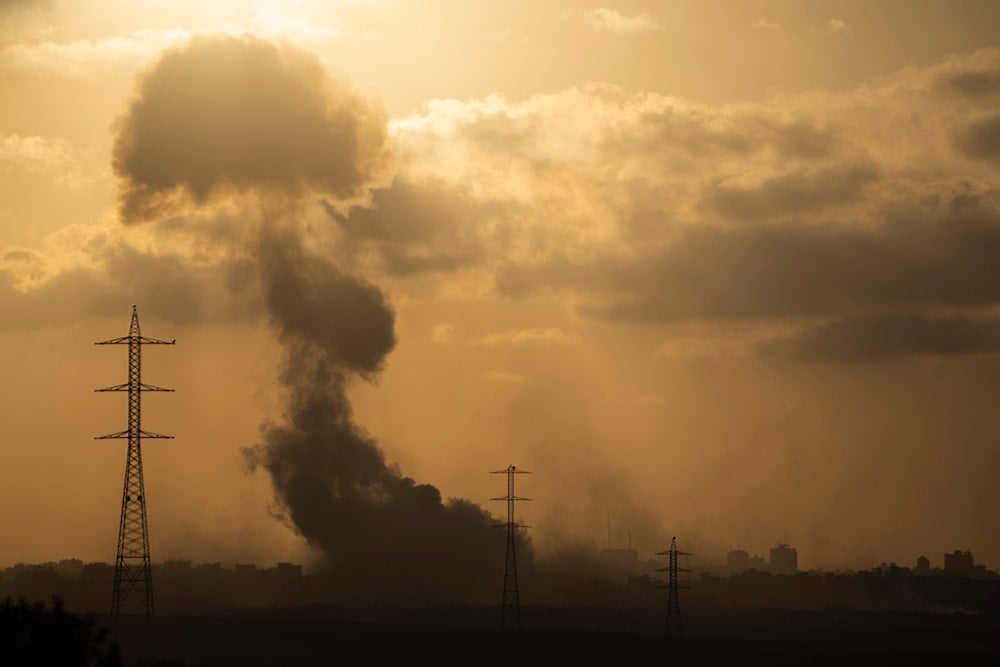Netanyahu's new conditions could stall ceasefire talks: WashPo
Questions remain open regarding how Hamas' position will evolve following Netanyahu's threatening remarks issued yesterday.
-

Smoke rises to the sky after an explosion in the Gaza Strip, as seen from southern occupied Palestine, Monday, July 8, 2024. (AP)
The Washington Post published an op-ed on Monday suggesting that the latest conditions laid out by Netanyahu's office for a potential ceasefire in Gaza could stall negotiations and prevent any deal from occurring altogether.
According to the report, "Israeli Prime Minister Benjamin Netanyahu injected new uncertainty into the negotiations," by insisting that "Israel" must retain the option to resume its aggression on Gaza as part of any agreement accepted by negotiators.
The report notes that his statement "appeared to raise the bar" for what "Israel" would agree to in a deal, and further dampened hopes for an imminent peace.
On Sunday, Netanyahu stipulated that "any deal will allow Israel to resume fighting until all of the objectives of the war have been achieved." A statement released from his office indicated that the prime minister would not be ready to fully endorse a permanent ceasefire until the Palestinian Resistance in Gaza is completely eliminated.
The report mentioned criticism on the part of the opposition as well as from captives' families who argue that his conditions are posing a serious hurdle to peace talks, while opposition leader Yair Lapid labeled Netanyahu's statement as "provocative messages."
Read more: 'Army not qualified for long wars': Lapid says, calling for ceasefire
Earlier today, Axios reported that CIA Director Bill Burns and President Biden's top Middle East advisor Brett McGurk landed in Cairo for high-stakes talks with senior Israeli and Egyptian security officials.
According to Axios, McGurk arrived in Cairo alongside Burns to initiate trilateral talks with Egyptian and Israeli counterparts on the prospects of a ceasefire agreement alongside plans to "secure the volatile Egypt-Gaza border," as was reported by Axios.
A senior Israeli delegation, led by the director of Shin Bet, "Israel's" internal security agency, is also partaking in the discussions.
The agenda includes the issue of reopening the Rafah crossing and fortifying security measures along the Egypt-Gaza border.
Read more: Negative Israeli battlefield calculations spur ceasefire talks: WSJ
The outcomes of these diplomatic maneuvers are said to be pivotal for the region's stability. Yet, the Israeli side has been obstinate in reaching an agreement.
Many of the captives who have died in the past nine months were killed as a result of "Israel's" indiscriminate bombardment of Gaza. The Israeli blockade of the Strip has further exacerbated this issue.
On July 6, Reuters reported, citing a senior Hamas source, that the movement accepted a US proposal to begin talks on releasing Israeli captives, including soldiers and men, 16 days after the first phase of an agreement aimed at ending the Gaza war.
The Palestinian Resistance group withdrew its demand for "Israel" to commit to a permanent ceasefire before signing the agreement. Instead, it will allow negotiations to work toward this goal during an initial six-week phase, as reported to Reuters by an anonymous source due to the private nature of the talks.
Two days prior, Hamas representative in Lebanon Ahmad Abdul Hadi told Al Mayadeen that the Resistance "will continue to battle [the Israeli occupation] if no agreement is reached."

 3 Min Read
3 Min Read








